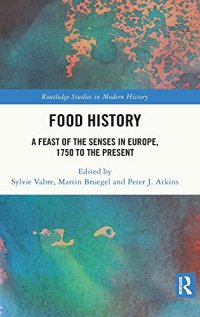
Ebook: Food History: A Feast of the Senses in Europe, 1750 to the Present (Routledge Studies in Modern History)
This pioneering book elevates the senses to a central role in the study of food history because the traditional focus upon food types, quantities, and nutritional values is incomplete without some recognition of smell, touch, sight, hearing, and taste.
Eating is a sensual experience. Every day and at every meal the senses of smell, touch, sight, hearing, and taste are engaged in the acts of preparation and consumption. And yet these bodily acts are ephemeral; their imprint upon the source material of history is vestigial. Hitherto historians have shown little interest in the senses beyond taste, and this book fills that research gap. Four dimensions are treated:
• Words, Symbols and Uses: Describing the Senses – an investigation of how specific vocabularies for food are developed.
• Industrializing the Senses – an analysis of the fundamental change in the sensory qualities of foods under the pressure of industrialization and economic forces outside the control of the household and the artisan producer.
• Nationhood and the Senses – an exploration of how the combination of the senses and food play into how nations saw themselves, and how food was a signature of how political ideologies played out in practical, everyday terms.
• Food Senses and Globalization – an examination of links between food, the senses, and the idea of international significance. Putting all of the senses on the agenda of food history for the first time, this is the ideal volume for scholars of food history, food studies and food culture, as well as social and cultural historians.
Putting all of the senses on the agenda of food history for the first time, this is the ideal volume for scholars of food history, food studies and food culture, as well as social and cultural historians.